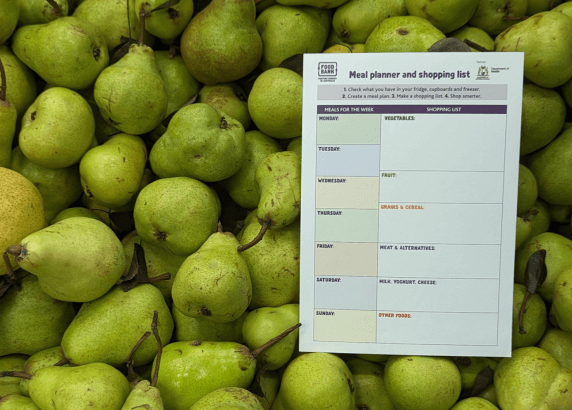Money saving tips and meal planning on a budget
Tips to tackle the cost of living
Here are some great tips to save money at the check-out.
Buy supermarket or home brand products and limit pre-prepared and convenience foods: e.g., grated cheese or sliced mushrooms as they are usually more expensive. Instead, buy a block of cheese and grate it or chop the mushrooms yourself to save money.
Where possible, buy fresh produce when in season: especially fruit and vegetables- local, fresher and cheaper. Farmers Markets are great for this.
Remember to include canned and frozen foods – a much cheaper alternative to fresh produce, especially if fruit and veg are out of season. You can also include beans/legumes to bulk out meat dishes to lower the price per serve or as a cheap meat-free meal.
Don’t be afraid to shop reduced items, look out for ‘reduced to clear’ stickers, but make sure you freeze or eat before the use by date.

Always look to freeze leftovers or excess produce or swap meals with friends or neighbours to increase variety!
Meal planning goes a very long way in saving time and money, makes shopping easier, minimises impulse eating and takeaway, promotes healthier food choices and ensures food variety, reduces stress.
Our four big tips for meal planning are:
- Stock take: check what you already have in your pantry, fridge and freezer (to avoid buying more of what you already have, and to plan meals around what ingredients need using up)
- Plan: create a meal plan for family meals/meals on the go (use the internet, Foodbank recipes, borrow recipe books from the library for inspiration on what to cook, if you are tired of cooking the same things). If meal planning for multiple days/meals, think about how you can use some ingredients in different meals if there may be excess.
- List: create a shopping list ensuring to include all 5 food groups (we recommend ordering your shopping list by food groups, as these foods are often grouped together in the supermarket, and it also helps you to see what food groups you might be missing!)
- Shop smart: stick to the list, don’t go hunger, shop around the perimeter of the shop & only go down the aisles you need, shop online. Compare unit prices to select better value for money.
Meal planning doesn’t have to be strict or boring. Don’t forget snacks in your shopping list meal plan- if you include these in your meal plan and have them on hand, you may be less likely to reach for the more expensive and less healthy options.
If you can, dedicate one block of time a week to do some bulk cooking or food preparation (e.g. grating cheese, making freezer meals, chopping vegies) to save yourself time on the busier days.
Meal planning doesn’t have to be for every meal, every day of the week. Even just meal planning for your cooked meals can help save money by only buying what you need, reducing food waste, and reducing the likelihood of buying fast food.
The best days for meal planning are those where you have routine, as these are the days you may be less spontaneous with eating and more likely to stick to your plan! Big tip – meal plan for work days rather than non-work days.
Tips like these are the same as those covered and explored in Food Sensations® for Children, proudly supported by Telethon. For families with young children, it can seem hard to balance healthy eating with meal planning, budgeting and meal prep. This is why Food Sensations for Children offers information like this and more, specially designed for families with kids. Find out more and book into a program soon.
 Contact us
Contact us Log in
Log in